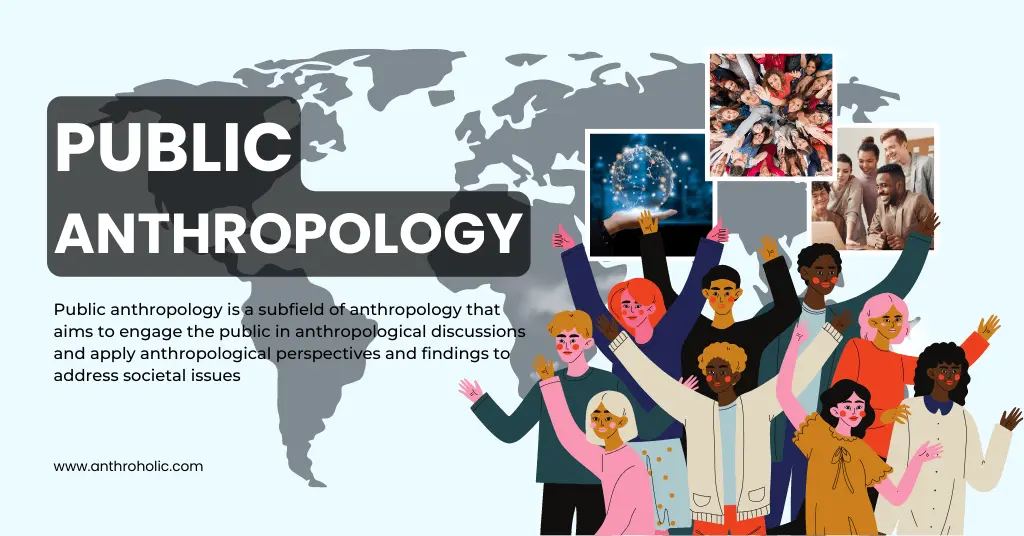AI Answer Evaluation Platform Live Now. Try Free Answer Evaluation Now
Public Anthropology
Anthropology has traditionally been confined within the walls of academia, where scholars engage in rigorous research and analysis of human societies and cultures. However, in recent years, there has been a growing movement towards making anthropology more accessible and relevant to the general public. This movement, known as public anthropology, seeks to bridge the gap between academic research and public understanding, promoting social change and addressing critical issues in society. Public anthropology brings anthropological knowledge to bear on contemporary societal problems, enabling a broader audience to engage with and appreciate the importance of anthropology in the modern world.

Public anthropology is a subfield of anthropology that aims to engage the public in anthropological discussions and apply anthropological perspectives and findings to address societal issues [7]. Public anthropologists strive to make their work accessible and relevant to a wider audience, using various communication mediums, including writing, film, photography, and social media. By doing so, they hope to foster a deeper understanding of cultural diversity and promote social justice.
The Roots of Public Anthropology
Public anthropology’s origins can be traced back to the late 19th and early 20th centuries when anthropologists such as Franz Boas and Bronislaw Malinowski sought to dispel popular misconceptions about other cultures [2]. Boas’s groundbreaking work on race debunked prevailing notions of racial superiority, while Malinowski’s ethnographic studies provided valuable insights into the social and cultural dynamics of non-Western societies. These pioneering anthropologists laid the foundation for a more socially engaged and publicly oriented anthropology.
The Role of Public Anthropologists
Public anthropologists play various roles in society, including:
- Educators and communicators: Public anthropologists work to educate the public about the importance of cultural diversity and the need for cultural sensitivity. They communicate their research findings and anthropological insights through accessible language and engaging formats such as public lectures, articles, podcasts, and exhibitions [4].
- Advocates for social justice: Public anthropologists often collaborate with marginalized communities to address pressing social issues such as poverty, racism, and environmental degradation. They use their anthropological expertise to inform policy, promote awareness, and foster positive change [6].
- Collaborators in community-based projects: Public anthropologists engage in collaborative research with community members to develop culturally sensitive and effective solutions to local problems. These partnerships can result in improved social services, sustainable development projects, and increased community empowerment [5].
Challenges and Criticisms
Public anthropology faces several challenges and criticisms, including:
- Balancing academic rigor and public engagement: Public anthropologists must navigate the tension between maintaining academic rigor and producing work that is accessible and engaging to the public. Critics argue that public anthropology can compromise scholarly standards in pursuit of public engagement [1].
- Ethical considerations: Public anthropologists must be mindful of the ethical implications of their work, particularly when engaging with vulnerable communities. Issues of consent, representation, and potential harm must be carefully considered [3].
- Measuring impact: Assessing the impact of public anthropology can be challenging, as it is often difficult to quantify the effects of public engagement on policy, social change, or public understanding [1].
Conclusion
Public anthropology offers a valuable means for anthropologists to engage with society and address pressing social issues. By communicating anthropological insights to a broader audience, public anthropologists can foster greater understanding of cultural diversity, promote social justice, and contribute to positive change. Despite the challenges and criticisms it faces, public anthropology remains an important subfield that has the potential to bridge the gap between academia and society, making anthropology more accessible and relevant to the public.
As the world continues to face complex social, political, and environmental challenges, the need for public anthropology becomes increasingly evident. By embracing a more publicly engaged approach, anthropologists can help shape public discourse, influence policy, and work towards a more just and inclusive society. As public anthropology continues to evolve and adapt to the changing world, it holds the promise of making a lasting impact on both the discipline and the communities it seeks to serve.
See Also
References
[1] Borofsky, R. (2000). Public anthropology: Where to? What next? Anthropology News, 41(5), 9-10.
[2] Eriksen, T. H. (2006). Engaging anthropology: The case for a public presence. Bloomsbury Academic.
[3] Lambert-Pennington, K., & Hicks, K. (2016). Public anthropology in 2016: A review of current disciplinary issues, challenges, and debates. American Anthropologist, 118(3), 536-550.
[4] Lassiter, L. E. (2005). The Chicago guide to collaborative ethnography. University of Chicago Press.
[5] Low, S. M., & Merry, S. E. (2010). Engaged anthropology: Diversity and dilemmas: An introduction to Supplement 2. Current Anthropology, 51(S2), S203-S226.
[6] Scheper-Hughes, N. (2009). Making anthropology public. Anthropology Today, 25(4), 1-3.
[7] Singer, M. (2000). Why I am not a public anthropologist. Anthropology News, 41(6), 6-7.



